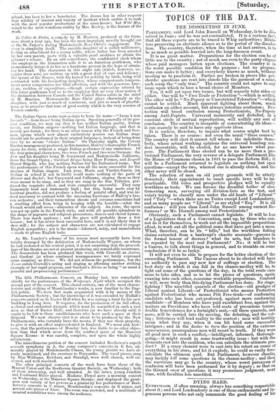The Italian Opera seems now-a-days to have its name—" lucus
i non lucendo "—from its not being Italian opera. Speaking generally of its pre- sent condition, we may say that it has neither Italian poetry, Italian music, nor Italian singers—nothing but Italian language, and that is merely pro forma - for there is no other reason why the French and Ger- man operas which now almost exclusively possess our Italian stage should not be performed in their original languages, instead of being done into by no means "choice Italian." On Thursday night, the Covent Garden management produced, in this manner, Halevy's thoroughly French opera La Aim, without a single Italian performer of any eminence. Of the four principal characters, two were French and two were German : the Jew and his daughter being M. Gueymard and Mademoiselle Julienne, from the Grand Opera; Cardinal Brogni being Herr Formes, and Leopold Signor Stigelli, who has nothing Italian but his Italianized name. But the performance of this French opera was all the more successful for the absence of Italian singers. Last year, Mario and Yiardot-Garcia (an Italian in school if not in birth) could make nothing of the parts of Eleazer and .Rachel; but Gueymard and Julienne, singing them as they were meant to be sung, and as they are sung in the Rue Pelletier, pro- duced the requisite effect, and were completely successful. They sang immensely loud and immensely high ; but this, being made easy by habitual practice, did not produce a feeling of painful effort, and was in- deed necessary to contend with the unceasing hurricane of Halevy's bra- zen orchestra ; and their tremendous shouts and screams sometimes had a startling efect from being in keeping with the horrible—what the French would call atroce—character of the subject. Au reste, the opera was got up quite in the French style, and with all possible splendour in the shape of pageants and religious processions dances and choral hymns. There was much applause ; and the piece ‘411 probably draw a few houses ; but it has never been successful here, and it is not likely that it over will ; for the subject and characters are not calculated to engage English sympathies • nor is the music—laboured, noisy, and unmelodious —made to please English taste.


























 Previous page
Previous page